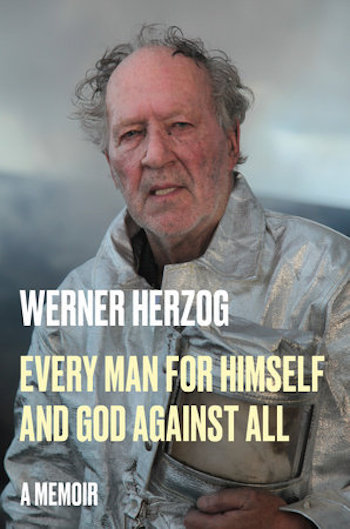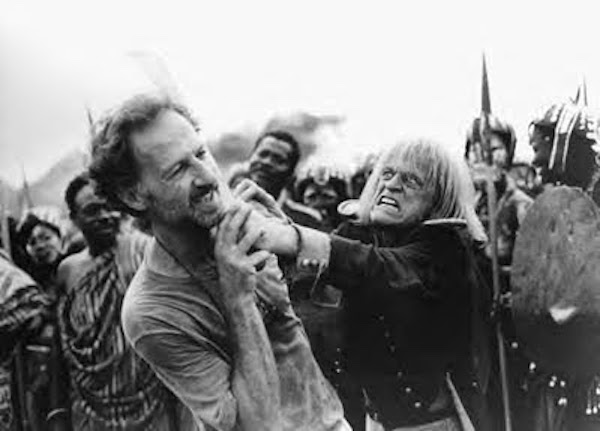Book Review: Filmmaker Werner Herzog’s Memoir — The Profound Voice of a Master
By Peter Keough
Werner Herzog likes the odds in Every Man for Himself and God Against All.
Every Man for Himself and God Against All: A Memoir, by Werner Herzog. Translated by Michael Hoffman. Penguin Random House. 367 pp. $30.
 Like Alfred Hitchcock, Orson Welles, and David Lynch, Werner Herzog might be better known for his voice than his images. Similar to those other auteurs, he has created a cultural presence, largely vocal, that rivals anything he has put on the screen. From The Simpsons to Jack Reacher (2012), his inimitable whisper is a signifier to which even those who haven’t seen any of his films will respond.
Like Alfred Hitchcock, Orson Welles, and David Lynch, Werner Herzog might be better known for his voice than his images. Similar to those other auteurs, he has created a cultural presence, largely vocal, that rivals anything he has put on the screen. From The Simpsons to Jack Reacher (2012), his inimitable whisper is a signifier to which even those who haven’t seen any of his films will respond.
A weary, oddly insinuating, sardonic, and Teutonic rasp, it has matured into a sublime instrument that evokes the consolation of despair, that reminds us, in a reassuring way, of the universe’s inexorable desolation and indifference, “the common denominator” of which, as he explains in Grizzly Man (2005), “is not harmony, but chaos, hostility, and murder.”
We hear him say these things, yet somehow they make us feel better. Why? Perhaps, in part, it is because they are a counterpoint to the reptilian hiss and bombastic roar of his alter ego and “best fiend” Klaus Kinski, who spits out lines such as “Ich bin der Zorn Gottes” in Aguirre, the Wrath of God (1972) with such demented conviction and utter depravity that you can’t help but wonder how, had he lived long enough, he might have fared in the world of MAGA politics.
Uncannily, the power of Herzog’s voice has extended beyond the realm of artifice and into the real world. For example, there is the experience of Joaquin Phoenix in 2006 when he flipped his car over. Trapped inside, he heard a tap on his window. “There was this German voice saying, ‘Just relax’,” Phoenix remembered. It was Herzog, who then helped extricate him from the vehicle. “There’s something so calming and beautiful about Werner Herzog’s voice,” Phoenix said. “I felt completely fine and safe.” In another incident in 2006, someone shot Herzog in the abdomen with an air rifle while he was being interviewed on the air by a BBC reporter. “It’s not a significant bullet,” the director commented, his voice resigned and jocular as he dismissed the wound. “It’s not an everyday thing but it doesn’t surprise me to be shot at.”
In his vastly entertaining, illuminating, and profound new memoir Every Man for Himself and God Against All, Herzog mentions these two anecdotes in passing. Given what he tells us about the extremity of his life, these dramatic interludes barely register. When it comes to narrow escapes, for instance, there is the occasion in 1961 when he was determined to visit Congo. But before he could cross the border into the country he came down with dysentery and spent weeks near death, shitting blood, in a shack in Egypt until he was rescued by German engineers working on the Aswan Dam. Later, he learned that Congo was then in a state of chaos and that many Western visitors to the country at that time had met with a much more terrible fate. In a similar instance, while making Aguirre the Wrath of God in 1971, he and members of his crew were bumped from a flight that then crashed, killing all but one passenger. He would later make a documentary about the survivor, Wings of Hope (1998).
This catastrophic — if creatively fecund — pattern was established from the beginning of his life. He was born at a treacherous time: on September 6, 1942, in Munich, just as the fortunes of the Third Reich were turning, with pending defeats at Stalingrad and El Alamein and just before the first major Allied air raid on the city would fill his crib with plaster fragments. Both his parents were Nazis. His mother, with whom he was close, was disaffected from the cause early on, but his ne’er-do-well father, a soldier in the Wehrmacht, remained bitter about the Reich’s defeat and the subsequent Americanization of Germany for long after the war.
In the past Herzog has been reticent about talking about his relationship with his father. Here he dismisses him as a bounder, bungler, and fraud who had little impact on his life. He describes how as a child he delighted in the paternal void. “[W]e had a magnificent time,” he recalls about growing up in rural postwar Bavaria, “especially as there were hardly any fathers in the village, so everything was in the best sense anarchic.” Could this absence of a father and reliance on his mother indicate an Oedipal turn in his psyche? Best not suggest that to Herzog, though, who writes, “I am convinced that it’s psychoanalysis — along with quite a few other mistakes — that has made the twentieth century so terrible.”

Director Werner Herzog grappling with Klaus Kinski during the filming of 1982’s Fitzcarraldo.
Though he suggests he has no inner life to speak of, no impulse to introspection, and insists he never dreams, Herzog does lay claim to entertaining the notion of “ecstatic truth,” which, when it doesn’t give him license to make up facts that point to a deeper reality, implies his belief in mysticism, a visionary capacity. He relates several examples of such epiphanies in the book, one of the earliest of which occurred while he was working on a fishing boat in Crete as a teenager. Gazing at the reflection of the stars in the sea, he recalls,
Bedded in a cosmos without compare, above, below, all around, a speechless silence, I found myself in a stunned surprise. I was certain that there and then I knew all there was to know. My fate had been revealed to me … lit up by such grace as I now was, there could never be anything like ordinary time for me again.
The book might seem anarchic, episodic, and free associative in organization. But it possesses, like Herzog’s best films, a deceptive structure. It begins where it ends and ends where it begins. It is divided into 36 thematic chapters, some cryptically named but most with pretty straightforward titles such as: “3. Mythical Figures” or “13. Congo” or “30. Villains.” The final chapter is ominously called “The End of Images,” and in it he writes,
The end is coming. I picture a radical turning away from thought, argument, and image, not just an approaching darkness in which certain objects can still be felt, but where they no longer exist at all, a darkness filled with fear, with imaginary monsters.
Somehow, if you imagine hearing this uttered in Herzog’s voice, it doesn’t seem so bad.
Peter Keough writes about film and other topics and has contributed to numerous publications. He had been the film editor of the Boston Phoenix from 1989 to its demise in 2013 and has edited three books on film, most recently For Kids of All Ages: The National Society of Film Critics on Children’s Movies (Rowman & Littlefield, 2019).

This review paints a vivid picture of a compelling personality with a memorable story to tell, not the least because of the films he has directed. So why begin it with the startling comment: “Like Alfred Hitchcock, Orson Welles, and David Lynch, Werner Herzog might be better known for his voice than his images.” What? Speaking of two of the greatest masters of the film image, specifically Hitchcock and Welles? Even in the statement’s own terms, their personae were at least as important as their voices, one scarcely distinguishable from the other since they typically came in the same package. David Lynch? I just know what he looks like, since he’s so kooky looking, but have no clue regarding his voice. His cinematic images are another thing altogether, more arresting than those of most directors of recent decades. Was such a comment intended to make the reader sit bolt upright and take notice? Well, it had that effect on this writer, but it doesn’t make any more sense for that.
So my little ploy worked…